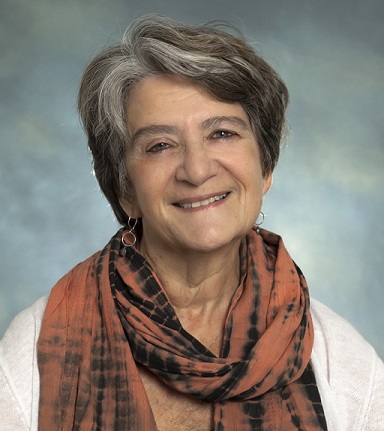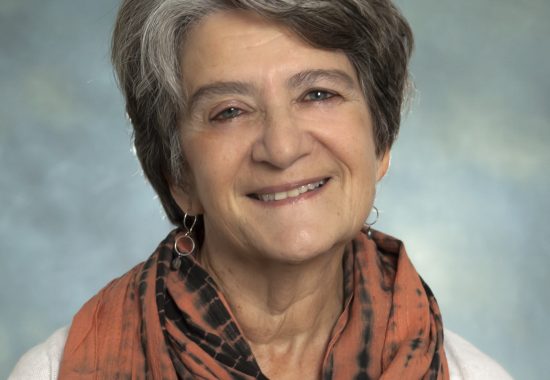
In 1992, Myrna F. Schwartz, PhD, co-founded Moss Rehabilitation Research Institute with former MRRI Director John Whyte, MD, PhD. As head of MRRI’s Language and Aphasia Laboratory, she directed a multi-disciplinary research program dedicated to the study of aphasia and its treatment. Dr. Schwartz’ research was continually funded by the National Institutes of Health for over 30 years.
Dr. Schwartz is one of the world’s most influential researchers of aphasia. Over the course of her career, she’s collaborated with and mentored some of the brightest minds in language and aphasia research. She has published well over 100 peer-reviewed scientific articles and has directly or indirectly helped diagnose and treat hundreds of patients recovering from stroke and other types of brain injury.
Early in her career, Dr. Schwartz worked with renowned scientists Dr. Eleanor Saffran and Dr. Oscar Marin at Johns Hopkins University. Their work centered on advancing a cognitive neuropsychological approach to the study of aphasia and language. The basic idea was that intensively studying individuals with aphasia to identify which aspects of language are disrupted versus preserved can reveal the underlying neurocognitive architecture for language. By going a step further and relating specific deficits in individuals to where they have damage in the brain after stroke, scientists can draw conclusions about brain-behavior relationships. Schwartz’s pioneering research laid new groundwork for how to apply general models of cognition to understand aphasia and likewise use the study of aphasia to inform models of cognition.
As an Institute Scientist at MRRI, Dr. Schwartz was integral to establishing the Institute’s Research Participant Registry, which is a HIPAA compliant, research recruitment infrastructure that permits tracking individual research volunteers over time to study them again and again. At MRRI, the Schwartz lab oversaw the collection of an extensive battery of neuropsychological tests on a large sample of people with aphasia. This provided foundational data for studies using a ‘case series’ approach. Case series is a powerful investigatory method in which theoretical constructs are derived that best capture behavioral variability across participants. This work produced seminal papers co-authored with leaders in related scientific disciplines, including prominent cognitive scientist Gary Dell, PhD, at the University of Illinois at Urbana-Champaign. Dr. Dell and Dr. Schwartz’s research on large case series of people with aphasia advanced the two-step interactive theory of lexical access, a scientifically rigorous computational model that explained abilities for word production in a broad range of people with aphasia and normal speakers. This theory remains one of the most influential in the study of language production, with the original papers garnering nearly 1,000 citations collectively.
More recently, in collaboration with local scientists including Dr. Branch Coslett, MD, PhD at the University of Pennsylvania, Dr. Schwartz conducted a series of investigations into the neuroanatomical correlates of word production. These studies involved large groups of people with aphasia, and they used state-of-the-art imaging techniques to link damaged areas in the brain to specific deficits in word production. Essentially, this lesion-analysis technique permits users to map theory-informed components of word production to the brain. These ground-breaking studies were published in highly-regarded, influential scientific journals including Brain and Proceedings of the National Academy of Sciences of the United States.
One of Dr. Schwartz’ lifelong passions is helping people with aphasia and their caregivers live life to the fullest. To this end, Dr. Schwartz helped found the MossRehab Aphasia Center. One of the first in the country, the Center provides support for people with aphasia and their caregivers. Its mission is to enhance life participation of people with aphasia by providing social opportunities, advanced assessment, and interventions to improve personal and environmental factors. Today, there are many aphasia centers throughout the country, dedicated to helping people with aphasia maintain a high quality of life despite chronic language problems.
A major focus of Schwartz’ work was to develop theory-grounded approaches to treatment. Among her clinical contributions, Dr. Schwartz and her colleagues developed a treatment protocol called Mapping Therapy, which is used to treat agrammatic aphasia, and the Philadelphia Naming Test, which helps identify the type of aphasia a patient has and can measure recovery over time. She and her colleagues also developed MossTalk Words, an evidence-based computer-assisted treatment program that people with aphasia and other language disorders can use in their home to supplement traditional speech therapy.
Myrna F. Schwartz continues to be involved in aphasia research in an emeritus role from California. She provides ongoing mentorship to junior scientists at MRRI, and she is active in organizations dedicated to raising awareness of aphasia and providing life-long support to individuals with aphasia. Her many contributions to aphasia research and treatment have left a lasting impact on the field, and Dr. Schwartz’ legacy will continue to drive aphasia research at MRRI and around the world.


20 comment on “Recognizing Dr. Myrna Schwartz”